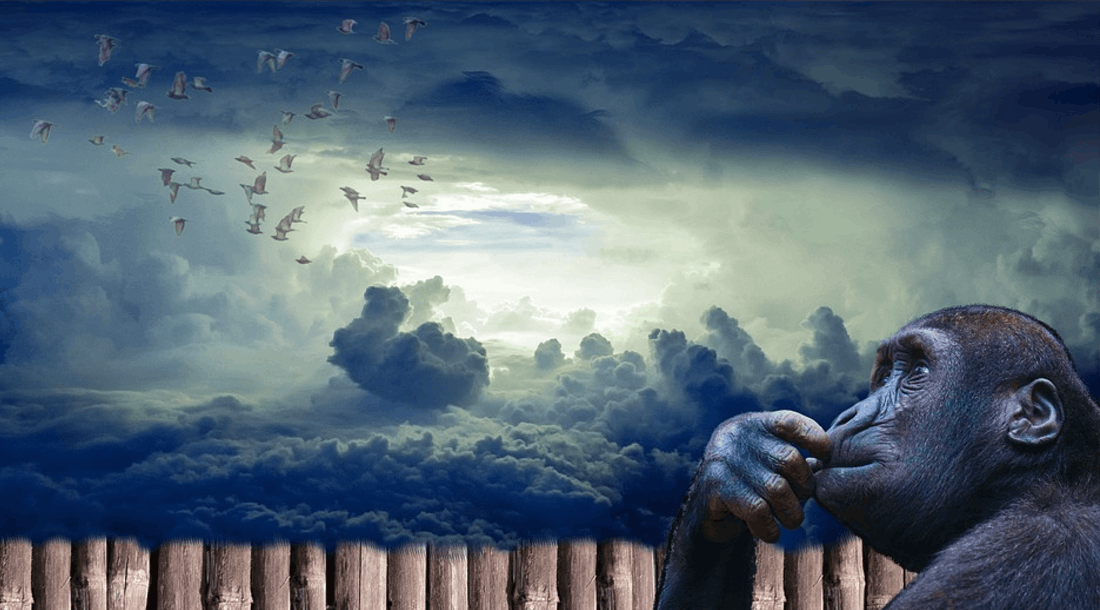and yet it lives ... Autonomy/Autarky/Autopoiesis

translated by Jürgen Große-Puppendahl
The simplest way to say "system" is: relations.
Systems theory is a reductionist science. It reduces systems in world to universal attributes in order to better predict how they will behave and to assess which models, measures, and methods will work for them and which will not.
We can observe three basal features in all complex living systems:
Autonomy → system sets (its) own values, establishes (its) own rules: self-legislation
Autarky → system constitutes its boundaries and expands/shrinks them
Autopoiesis → system creates itself, sustains itself, and organizes itself
Complex autopoietic systems like the human psyche or communication cannot leave their sign universes, their semiospheres: they inFORM themselves. Events in Umwelt [1] cannot penetrate the system boundary. Those that collide with it are at best (further) processed as signs in the semiosphere of the system.
Psyches think/imagine, communication systems communicate. Psyches do not communicate, communication systems do not think.
If thought is to become social, it must be communicated. If it is communicated, it is not (anymore) thought, and what happens as a consequence (of it), psyche has no control over it – because as a living system society FORMs itself autonomously and autarkically.
If something communicated is to become part of psyche, there must be psyche thinking it, but psyches don not communicate, they think, and what we say to someone and what (s)he makes out of it becomes several things – because as a living system, psyche FORMs itself autonomously and self-sufficiently.
When it comes to psyche and society, we have to think of different complexities in different sign spaces. We can observe the same universal attributes on both and map them accordingly using FORMenlogik and emulate the FORMS as artificial systems, but that is all about it.
When they hear autonomy, many think first of laws and states, of freedom and independence – systemically, however, we have to take the concept much deeper, become even more concrete: We are talking here about the values the system sets for itself in order to decide. When and how do I go left? How do I drink my milk (from the carton or the glass)? How do I respond to emotional triggers? When do I cry, when do I not, when do I react to a sensation of hunger? …
Autonomy creates the decision structure of the decision structure. Autonomy is not a property that we bestow, but a capability and problem of the living system. We cannot abolish the autonomy of the living system just when it does not suit us.
With autarky we mean here that the system decides in dealing with its own and the complexity of its environment, what it considers to be part of itself and what not, whereby it can increase or limit itself. The better a system deals with complexity, the more complexity it can handle and the more complexity it creates in turn.
What it considers as belonging to itself or to Umwelt depends on its degree of autarky.
It is not us who bestow autarky or autonomy on the living system; living systems must produce their own autonomy and autarky as conditions of their continuing processing.
If we try to circumvent/abolish autonomy and autarky of a living system, we fail to recognize the necessity of these attributes for life: The success of this attempt is the death of the system.
In application:
Autonomy/Autarky/Autopoiesis function together.
Autopoietic systems like psyche and society set their own values (autonomy) and FORM, extend/shrink their boundaries (autarky). They constitute (create and reproduce) their own elements (autopoiesis).
In the case of psyche:
Thought and imagination with → think a thought (thought). Now think how you think the thought (imagination) with a concept of "thought" that includes non-linguistic choices such as feeling.
In the case of communication:
Deeming|Telling|Understanding
with Ego interprets Alter's behavior as telling behavior and assumes a deeming by Alter.
https://www.carl-auer.de/magazin/systemzeit/communication-reorganization-of-undetermined
In short: psyches think, social systems communicate.
If we try to grasp psyches with models constructed for social systems, we do not reach them. If we try to treat social systems psychologically, we grasp at nothing.
Respecting autonomy, autarky and autopoiesis of the system in question means working with models, methods, measures that work for them.
Some problematic examples:
Healing society from its traumas The concept of trauma has been constructed for psyches. It cannot be transferred to social systems, to an organization, or society. If we try to "heal" societies from their "traumas", we will experience that new "traumas" will emerge again and again. This is point 1 of the problem.
Point 2: We respect here neither autonomy nor autarky of the social system, ignore its element (communication) and try to treat society like psyche. Apart from the fact that psyches must also allow us to work with them therapeutically, there are simply no docking points in society for therapeutic attempts. We may reach individuals with it, but we cannot predetermine what consequences this will have again in the social space or even for them. We can learn to communicate more efficiently, but even with this we still have no control over the complexity of the overall system.
The system decides autonomously and autarkically about system change. Lenin and Mao both tried to "cure" the system ...
Psyches can only treat themselves. Traumas cannot be cured, but the psyche can learn to endure its traumas. We should be able to invisibilize and visibilize our traumas. And if we make them visible, we should also be better able to deal productively with their self-multiplying tendencies.
Creating safe spaces
Autonomy/autarky/autopoiesis mean that the system decides which values it follows and which boundaries it sets and respects. Trying to create protected spaces within social systems, for example for improved education or better togetherness, is highly problematic in terms of the concept itself:
There are no safe spaces in complex autopoietic systems, as anyone knows who has tried to keep others from spreading rumors under the guise of secrecy.
Anyone who believes that resilience is strengthened by demarcation overlooks real life and probably also believes that lions do not attack people when they are locked up in a zoo …
All complex autopoietic systems are in the process of continuous innovation. They increase their resilience by autonomy and autarky and functional organization taking into account their autonomy and autarky.
The idea of a safe space is a psychotherapeutic one. It no longer functions as a controllable measure for social systems of 3 persons or more. In fact, it does not work as a controllable measure at all, because each psyche also interprets something different as "safe".
What is meant here is usually something else, but concepts are power, so it makes sense to first reference what we actually want to achieve before we unleash a concept like "safe spaces" on humanity and in order to see then what esotericists are doing with it ...
When I address safe spaces, contents are lost - the safe space is communicated. Its precondition becomes its impossibility.
Narration and storytelling as a measure for crisis functional organization.
The fact that many of us are enthusiastic about stories does not guarantee that the story will have the effect that the storyteller might imagine.
Social and psychic systems tell their own stories, and psychic systems cannot be controlled via stories in social systems, just as, conversely, psychic narration cannot dock in society because it is thought and not communicated. We cannot produce thoughts into society just like that.
Psychic systems think, social systems communicate.
The social narrative is the story we continuously write collaboratively. Here we need to comprehend that system complexity keeps the narrative from working to the point.
Awkward and intransigent thinkers are lateral in their thinking not in spite of, but (with) because of "the movie trilogy "Matrix"". All the nice stories we tell children do not stop them from doing the strangest things when grown up.
Narration is a means of reciprocal conditioning and promotion.
Even if we try to coin the concept of narration in a positive way, it does not become a positive means. The story can be as beautiful as it is and still have negative consequences.
Mao's "Little Red Book" is a narrative. Likewise Hitler's "Mein Kampf".
When someone thinks (s)he has a narrative, (s)he usually also has an end goal for the system in mind. Someone who imagines that (s)he can generate this solution for the system has not even begun to understand what system theory means. The complex system can generate the solution only for itself. It cannot be locked up into predetermined stories.
That does not mean we cannot do anything, but it does mean we can do a whole lot of things that are fundamentally wrong, misleading, and definitely not on target.
Pogroms and slavery have been triggered by narrative.
Mindfulness as a means of changing social systems
Although reflective communication can help create more constructive social architectures, attempting reflective intervention in communication cannot predict how the system will change. As with all means, the system can and will respond with counter-reactions. There are not only people, but also organization-FORMs that respond to mindfulness with resistance – for example, because they find it encroaching or because system complexity cannot be pigeonholed.
Mindfulness works as a psychotherapeutic self-measure – but even there only within limits and with drawbacks. This becomes apparent (for example) in crises when large parts of the population begin to study mindfulness, practice it and engage with themselves because their prosperity allows them to do so, while the crises require completely different measures to be averted and used in a way that is constructive for everyone's survival.
As a social tool, mindfulness is a waste of time. Social systems reflect themselves via communication, not via thinking. The means of choice is FORMs analysis and functional FORM design.
Mindful people can completely ignore the concerns and needs of social systems without realizing it. They can even use it to create markets that work for some time and reinforce each other in them. Mindfulness models are constructed for psyches. As social models, they can at most become effective as a topic and ideologically, and what the social system then does with them, psyche has no influence on.
If I try to condition, prescribe or impose mindfulness in society, in doubt, I lay the foundation for social control systems. In the end, mindfulness is achieved that no longer differs from conformity: being mindful, taking care that no one steps out of line.
We know social mindfulness, for example, as mutual education programs on social media or as Stasi [2]. Mindfulness cultures do not guarantee a better society.
Mindfulness prescriptions often lead into religious forms with warlike outcome. Good will of the individual (Jesus, Buddha ...) cannot control the social system.
Respecting the autonomy/autarky/autopoiesis of the system is necessary to functionally build and use models and methods. Systems theory helps to assess whether what we are trying to do is appropriate to the issue we are trying to address. It helps to check one's own beliefs – assuming the willingness to do so, which is by no means given (everywhere):
"What the thinker thinks, the prover will prove" works on our own doorstep as long as the complexity of the overall system does not force us into crisis.
At the moment, in many places, attempts are being made to grasp matters of society (and thus of communication system(s)) with psychological models. However, this helpless and often self-affirming attempt must fail and will have unpredictable and predictable consequences, because such measures fail at the system boundary, at the autonomy, and autarky of the system. History has already shown us what to expect in the worst cases from measures that do not respect system boundaries. You can see this if you take systems theory seriously and start to work with it accordingly seriously/ mindfully.
SelFis and Crazy Machines help visualize autonomy/autarky/autopoiesis.
We address psyche via psychological models, social systems via sociological ones. The one who cannot tell apart and still win at it is working in a bubble.
The fact that many today do not know what to do in order to deal with the complexity of the (overall) situation does not mean that there are no ways to find out in which direction we should move and which models and measures we should immediately put aside because they will not work the way we think they will.
We can learn to work continuously with concepts such as autonomy, autarky, and autpoiesis and, for example, examine crisis and conflict FORMs in terms of them.
It is important to face the respective system complexity and not to be satisfied with working with undercomplex or even non-systemic models just because we are allowed to do so and get recognition in the form of understanding, reputation or money, or because they fit into our reality tunnel and we want it that way, or because we are not willing to question our own self-fulfilling prophecies. Peer pressure and ideological impulse should not prevent us from doing what is necessary – provided, of course, we take the metacrises seriously. New markets will be opened up by the brave and the smart before the crisis catches them.
The question must therefore first be: Do we want to continue playing around in the sandbox universe next door (for whatever recognition and self-affirmation) or are we ready to move more towards factual space, new society and new markets through scientific knowledge and models?
If the answer to this is "Yes, more factual thinking, speaking and acting!", the three terms autonomy, autarky, and autopoiesis are already of considerable help when it comes to assessing whether what we are planning to do actually brings something or whether we are only doing it because we can still do it and because it still brings us personal gains.
The first application of the new model is always myself and irritation acts as a guide.
[1] The German word for environment, chosen here with care, to indicate system/Umwelt as a difference for which applies: everything that system "knows" about Umwelt takes place as sign process in system.
[2] „Stasi“ is the abbreviation for „Staatssicherheitsdienst“, the State Security of the GDR.




